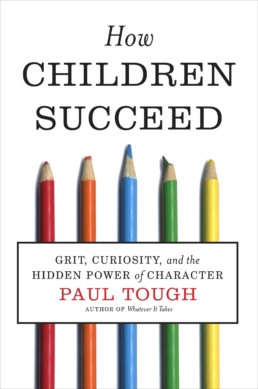Why do some children succeed while others fail? The story we usually tell about childhood and success is the one about intelligence: success comes to those who score highest on tests, from preschool admissions to SATs. But in How Children Succeed, Paul Tough argues that the qualities that matter more have to do with character: skills like perseverance, curiosity, optimism, and self-control.
“Pure IQ is stubbornly resistant to improvement after about age eight. But executive functions and the ability to handle stress and manage strong emotions can be improved, sometimes dramatically, well into adolescence and even adulthood.”
– Paul Tough, How Children Succeed: Grit, Curiosity, and the Hidden Power of Character
How Children Succeed introduces us to a new generation of researchers and educators, who, for the first time, are using the tools of science to peel back the mysteries of character.
Through their stories—and the stories of the children they are trying to help—Tough reveals how this new knowledge can transform young people’s lives.
He uncovers the surprising ways in which parents do—and do not—prepare their children for adulthood. And he provides us with new insights into how to improve the lives of children growing up in poverty.
This provocative and profoundly hopeful book will not only inspire and engage readers, it will also change our understanding of childhood itself.
“What matters most in a child’s development, they say, is not how much information we can stuff into her brain in the first few years. What matters, instead, is whether we are able to help her develop a very different set of qualities, a list that includes persistence, self-control, curiosity, conscientiousness, grit and self-confidence.”
“The part of the brain most affected by early stress is the prefrontal cortex, which is critical in self-regulatory activities of all kinds, both emotional and cognitive. As a result, children who grow up in stressful environments generally find it harder to concentrate, harder to sit still, harder to rebound from disappointments, and harder to follow directions. And that has a direct effect on their performance in school.”
“the key channel through which early adversity causes damage to developing bodies and brains is stress.”
“What matters, instead, is whether we are able to help her develop a very different set of qualities, a list that includes persistence, self-control, curiosity, conscientiousness, grit, and self-confidence. Economists refer to these as noncognitive skills, psychologists call them personality traits, and the rest of us sometimes think of them as character.”

